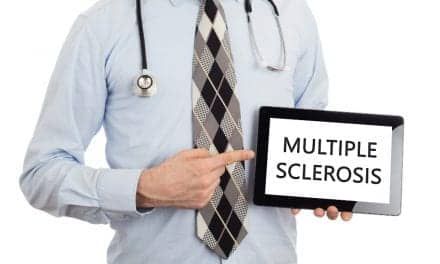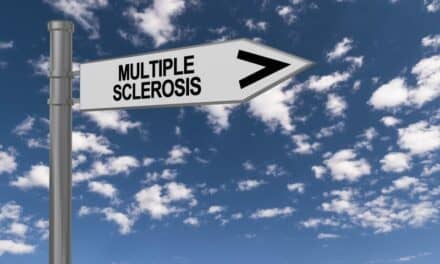Multiple sclerosis (MS) patients undergoing anti-CD20 (aCD20) treatment — which depletes the B cells that contribute to the MS attacks — are able to mount robust T-cell responses to the mRNA COVID-19 vaccines, despite having a muted antibody response to the vaccines, researchers suggest.
Because B cells are responsible for antibody production, patients’ ability to produce antibodies that prevent the virus from entering and infecting a person’s cells is significantly muted when the B cells are depleted with aCD20 treatment. But the same patients are nonetheless able to mount very good responses of the second protective arm of their immune system, which uses T cells to eliminate cells once infected (thereby preventing viral spread to other cells), according to new research from the Perelman School of Medicine at the University of Pennsylvania in a new paper published in Nature Medicine.
“The message from this study is clear — it is worthwhile for patients with MS receiving aCD20 treatment to get a COVID-19 vaccine, which will prevent severe illness. Based on this body of evidence, we urge patients with MS receiving aCD20 treatment to get a COVID-19 vaccine if they haven’t already.”
— one of the senior authors, E. John Wherry, PhD, chair of Systems Pharmacology and Translational Therapeutics and director of the Penn Institute for Immunology
Antibody and T Cell Responses
The study measured both the antibody and T cell responses in 20 patients with MS who were undergoing aCD20 treatment, compared to those in a group of healthy controls. None of the participants in the study had prior clinical signs or symptoms of COVID-19. Researchers analyzed plasma and peripheral blood mononuclear cell samples five times over the study period: prior to the first vaccine dose, 10-12 days following the first vaccine dose, prior to the second vaccine dose, 10-12 days following the second vaccine dose, and 25-30 days following the second vaccine dose.
All healthy control subjects generated both anti-spike and anti-receptor-binding domain (RBD) antibodies following the first dose of mRNA vaccine, and the level of antibody increased further after the second dose. However, in patients with MS, the antibody response was far more varied. By 30 days after the second vaccine dose, 85% of participants developed anti-spike antibodies, and 50% mounted anti-RBD responses. For those subjects who did have detectable antibodies, the magnitude of response was generally lower, and the response was delayed compared to the control group.
The timing of a patient’s last aCD20 infusion — typically administered every 6 months — played a significant role in the immune response mounted. Patients with MS with higher percentages of circulating B cells prior to the vaccine had more robust antibody responses to the vaccine, a media release from University of Pennsylvania School of Medicine explains.
“This data not only reveal that patients undergoing anti-CD20 infusions are still able to mount important COVID-19 vaccine responses which are likely to protect from severe illness, but also informs our clinical practices in how we advise patients with MS and other autoimmune disorders on such therapies. For example, knowing that responses are weakest immediately following an anti-CD20 infusion, we can now advise patients to wait a number of months after their therapy to get a COVID-19 vaccine.”
— another of the paper’s senior authors Amit Bar-Or, MD, FRCPC director of the Center for Neuroinflammation and Experimental Therapeutics and chief of the Division of MS and Related Disorders
T Cell Responses
Researchers found that patients who had undergone aCD20 treatments had subpopulations of T cells that responded similarly to vaccination as healthy control subjects. Patients who underwent aCD20 therapy generated robust CD4 and CD8 T cell responses to the COVID-19 vaccination. Further, the CD8 T cell response was especially robust among the subgroup of patients with MS who didn’t generate RBD antibodies. This observation reveals that even without circulating B cells, the COVID-19 vaccine effectively primed patients’ immune response to the virus.
“Often when determining if a patient mounted a proper response to an mRNA vaccine, we test for the presence of antibodies, but this method neglects an entire arm of a person’s immune response. Measuring both antibodies and T-cell response gives us a more complete picture of a patient’s immune response, and reveals that patients who can’t generate antibodies as well as a healthy person are actually still protected by the COVID-19 vaccine.”
— one of the lead authors Sokratis A. Apostolidis, MD, a fellow in the Department of Rheumatology
The researchers do note that due to the limited antibody responses mounted by patients receiving aCD20 treatments, they might not be able to neutralize the virus as quickly before it infects other cells, which could result in them being contagious carriers of the virus for a longer period of time, per the release.
[Source(s): University of Pennsylvania School of Medicine, Science Daily]
Related Content:
Should You Get the COVID-19 Vaccine If You Have MS?
Online Tool Aims to Provide Updated COVID-19 Info for MS Community





